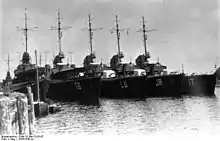German torpedo boat Tiger (1928)
Tiger was the third of six Type 24 torpedo boats built for the German Navy (initially called the Reichsmarine and then renamed as the Kriegsmarine in 1935) during the 1920s. The boat made multiple non-intervention patrols during the Spanish Civil War in the late 1930s. Tiger was sunk by a German destroyer in August 1939 which accidentally rammed her during night training.
.jpg.webp) Tiger, underway about 1930 | |
| History | |
|---|---|
| Name: | Tiger |
| Namesake: | Tiger |
| Builder: | Reichsmarinewerft Wilhelmshaven |
| Yard number: | 112 |
| Laid down: | 2 April 1927 |
| Launched: | 15 March 1928 |
| Commissioned: | 15 January 1929 |
| Fate: | Sunk in a collision, 27 August 1939 |
| General characteristics (as built) | |
| Class and type: | Type 24 torpedo boat |
| Displacement: | |
| Length: | 92.6 m (303 ft 10 in) o/a |
| Beam: | 8.65 m (28 ft 5 in) |
| Draft: | 3.52 m (11 ft 7 in) |
| Installed power: |
|
| Propulsion: |
|
| Speed: | 34 knots (63 km/h; 39 mph) |
| Range: | 1,997 nmi (3,698 km; 2,298 mi) at 17 knots (31 km/h; 20 mph) |
| Complement: | 129 |
| Armament: |
|
Design and armament
Derived from the preceding Type 23 torpedo boat, the Type 24 was slightly larger and faster, but had a similar armament.[1] The boats had an overall length of 92.6 meters (303 ft 10 in) and was 89 meters (292 ft 0 in) long at the waterline.[2] They had a beam of 8.65 meters (28 ft 5 in), and a mean draft of 3.52 meters (11 ft 7 in). The Type 24s displaced 932 long tons (947 t) at standard load and 1,319 long tons (1,340 t) at deep load. Tiger's Vulcan geared steam turbine sets, each driving one propeller, were designed to produce 23,000 metric horsepower (17,000 kW; 23,000 shp) using steam from three water-tube boilers which would propel the boats at 34 knots (63 km/h; 39 mph).[3] The boats carried enough fuel oil to give them a range of 1,997 nmi (3,698 km; 2,298 mi) at 17 knots (31 km/h; 20 mph).[4]
As built, the Type 24s mounted three 10.5 cm (4.1 in) SK C/28 guns, one forward and two aft of the superstructure, numbered one through three from bow to stern. They carried six above-water 50 cm (19.6 in) torpedo tubes in two triple mounts[2] and could also carry up to 30 mines. After 1931, the torpedo tubes were replaced by 533 mm (21.0 in) tubes[1] and a pair of 2 cm (0.8 in) C/30 anti-aircraft guns were added.[5]
Construction and career

Tiger was laid down at the Reichsmarinewerft Wilhelmshaven (Navy Yard) on 2 April 1927[3] as yard number 112,[6] launched on 15 March 1928 and commissioned on 15 January 1929.[3] The boat was initially assigned to the 3rd Torpedo Boat Half-Flotilla and by the end of 1936 she was assigned to the 2nd Torpedo Boat Flotilla. She made several deployments to Spain during the Spanish Civil War. Around June 1938, Tiger was transferred to the 3rd Torpedo Boat Flotilla which was renumbered the 6th Flotilla on 1 July.[7]
Shortly before the German declaration of war on Poland on 1 September 1939, many of the Kriegsmarine's torpedo boats and destroyers were training in the Baltic Sea. At 02:34 on 27 August, the destroyer Z3 Max Schultz accidentally rammed the darkened Tiger, which sank at 03:13 with two men dead and six wounded. The survivors were rescued by the destroyer, which had her bow damaged, but suffered no casualties of her own.[8]
Notes
- Gröner, p. 191
- Gardiner & Chesneau, p. 237
- Whitley 2000, p. 58
- Whitley 1991, p. 202
- Whitley 1991, pp. 47, 202; Whitley 2000, pp. 57–58
- Gröner, p. 192
- Whitley 1991, pp. 77–79
- Whitley 1991, p. 82
References
- Gardiner, Robert & Chesneau, Roger, eds. (1980). Conway's All the World's Fighting Ships 1922–1946. London: Conway Maritime Press. ISBN 0-85177-146-7.
- Gröner, Erich (1990). German Warships: 1815–1945. Volume 1: Major Surface Warships. Annapolis, Maryland: Naval Institute Press. ISBN 0-87021-790-9.
- Rohwer, Jürgen (2005). Chronology of the War at Sea 1939–1945: The Naval History of World War Two (Third Revised ed.). Annapolis, Maryland: Naval Institute Press. ISBN 1-59114-119-2.
- Whitley, M. J. (2000). Destroyers of World War Two: An International Encyclopedia. London: Cassell & Co. ISBN 1-85409-521-8.
- Whitley, M. J. (1991). German Destroyers of World War Two. Annapolis, Maryland: Naval Institute Press. ISBN 1-55750-302-8.